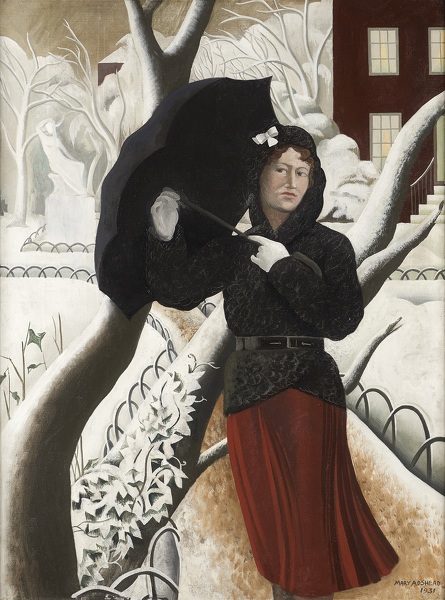
Portrait of Marjorie Gertler, 1931
Framed (ref: 9866)
Oil on canvas
Signed and dated
39 ¼ x 30 in. (100 x 76 cm)
Tags: Mary Adshead oil landscape portraits women Fifty Works by Fifty British Women Artists 1900 - 1950

Oil on canvas
Signed and dated
39 ¼ x 30 in. (100 x 76 cm)
Tags: Mary Adshead oil landscape portraits women Fifty Works by Fifty British Women Artists 1900 - 1950
Provenance: Private Collection
Exhibited: 50/50; Fifty British Women Artists 1900 – 1950, Worshipful Company of Mercers (3rd December 2018 - 23rd March, 2019); The Stanley & Audrey Burton Gallery, University of Leeds (9th April, 2019 - 27th July, 2019).'For Real: British Realists from the 20s and 30s', Museum MORE, Gorssel (September 15th, 2019 – January 5th, 2020).
Much in this painting is recognisable as Mary Adshead’s work: the careful craftsmanship of the paint, the French inflexion in the simplified shapes of trees and leaves, the hint of Neo-Victorianism in the setting and the flatness typical of a ‘decorative’ painter who specialised in murals. Other things are different: it is a portrait of a known individual, a friend who lived locally in Hampstead, and the mood is as sombre as the colours.
We know about Marjorie Hodgkinson chiefly for her part in the life of her husband, the painter Mark Gertler (1891–1939), and as the mother of his son, Luke Gertler. Their friendship and marriage were not, like Gertler’s largely frustrated affair with his fellow student Dora Carrington, a storm at sea but more a slowly advancing tide when, in 1929, Marjorie accompanied Mark to a sanatorium in Norfolk where he went to stave off a relapse into TB. They were married secretly by the British Consul on a trip to Paris in 1930, to avoid Gertler’s family making objections to him marrying a gentile, and moved into a flat in Kemplay Road, Hampstead. For a while, life was good to them, and Luke was born in 1932, but Mark’s picture sales went flat and Marjorie’s health declined.
When Mary Adshead painted the winter portrait, none of the later crises – culminating in Mark’s suicide – could be foreseen. It is one of her most eloquent works, an exercise in controlled colour, with a figure elegantly but rather precariously poised in the act of turning towards us with a face that carries foreboding.
Commentary by Alan Powers, writer, curator and teacher specialising in mid-twentieth-century British art, architecture and design. His book Bauhaus Goes West: Modern Art and Design in Britain and America will be published in 2019.